Pt (where p_(2)are pressures) cell reactioin will be spontaneous if:
The correct Answer is:B
Step by step video, text & image solution for |underset("("p_(1)")")(H_(2))|underset("("p_(1)")")(H^(+))|underset("("1M")")(H^(+))|underset("("p_(2)")")(H_(2))| Pt (where p_(1) and p_(2)are pressures) cell reactioin will be spontaneous if: by Chemistry experts to help you in doubts & scoring excellent marks in Class 12 exams.
Updated on:21/07/2023Topper's Solved these Questions
- ELECTROCHEMISTYBook:GRB PUBLICATIONChapter:ELECTROCHEMISTYExercise:Batteries
Explore 10 Videos
- ELECTROCHEMISTYBook:GRB PUBLICATIONChapter:ELECTROCHEMISTYExercise:Thermodynamics in Electrochemistry
Explore 22 Videos
- ELECTROCHEMISTYBook:GRB PUBLICATIONChapter:ELECTROCHEMISTYExercise:Galvanic Cell and Salt Bridge
Explore 85 Videos
- D-BLOCK ELEMENTSBook:GRB PUBLICATIONChapter:D-BLOCK ELEMENTSExercise:Subjective Type
Explore 18 Videos
- ENVIRONMENTAL CHEMISTRY Book:GRB PUBLICATIONChapter:ENVIRONMENTAL CHEMISTRY Exercise:Straight objective type
Explore 40 Videos
Similar Questions
Knowledge Check
Pt∣∣∣H2(p1)∣∣∣H+(1M)∣∣∣∣∣∣H+(1M)∣∣∣H2(p2)∣∣∣Pt (where p1 and p2 are pressure) cell reaction cell reaction will be spontaneous if:
Ap1=p2Bp1>p2Cp2>p1Dp1=1atmPt|Cl2(P1atm)|HCl(0.1M)|Cl2(P2atm)|Pt, cell reaction will be spontaneous if
Ap1=p2Bp1>p2Cp2>p1DP1=P2=1atmFor the concentration cell
Pt(H2−p1)∣∣H+(0.5M)∣∣Pt(H2−P2) the cell reaction will be spontaneous ifAp1=p2Bp1>p2Cp2>p1DNone of these
 (i)Br2,H+−−−−−−−−→(ii)C6H5OnaP,P will be
(i)Br2,H+−−−−−−−−→(ii)C6H5OnaP,P will be
View SolutionC6H5C(P)H2OH2,C6H5C(Q)OOH,C6H5O(R)CH3,C6H5O(S)H:
View SolutionPt(H2)(p1)∣∣H⊕(1M)∣∣(H2)(p2),Pt cell reaction will be exergonic if
View SolutionThe e.m.f. of the followig cell,
Zn∣∣∣ZnSO4(1M)∣∣∣∣∣∣H+(1M)∣∣∣H2g1atm∣Pt is 0.769 volts
The reduction potential of Zn electrode will be
View SolutionConsider the cell :
Pt|H2(p1atm)|H⊕(x1M)∣∣∣H⊕(x2M)∣∣H2(p2atm)Pt.
The cell reaction be spontaneous if
View Solution